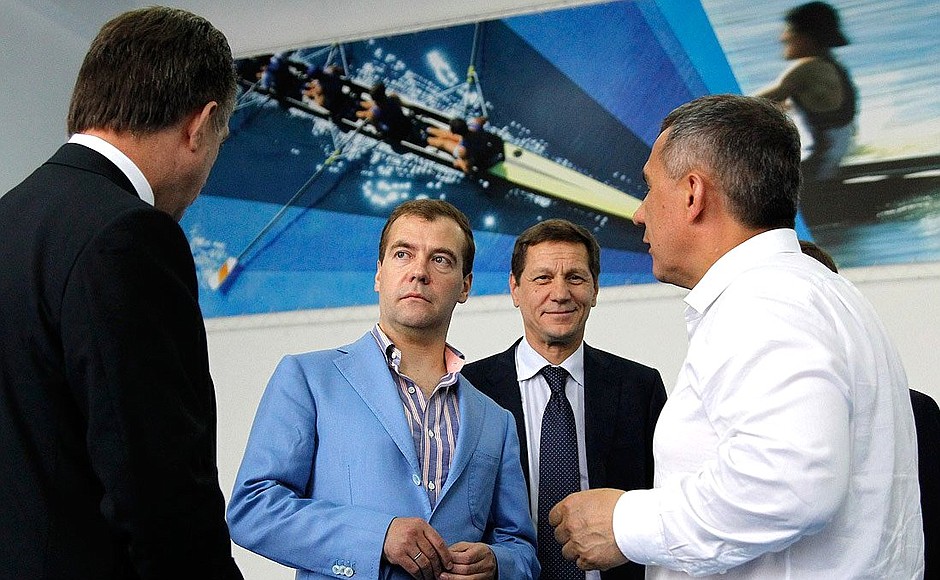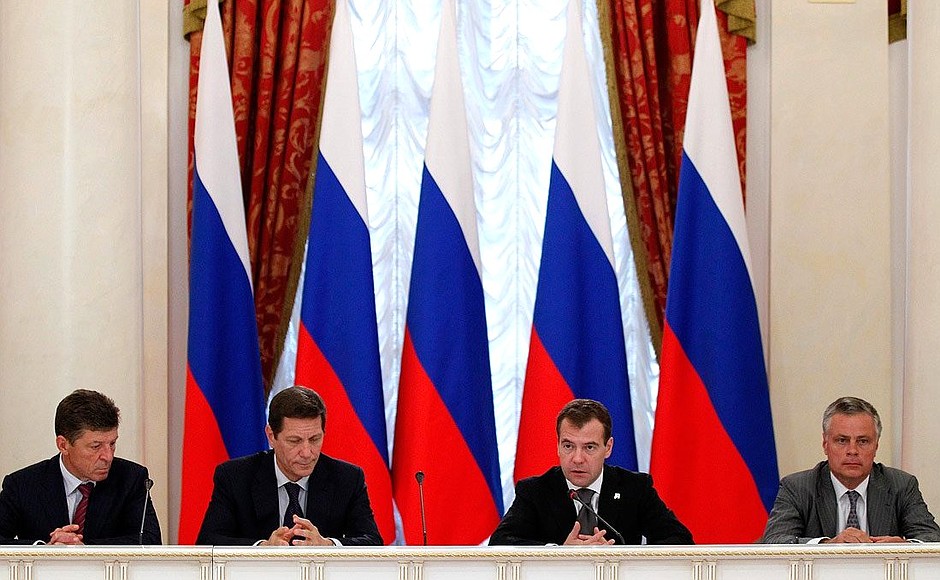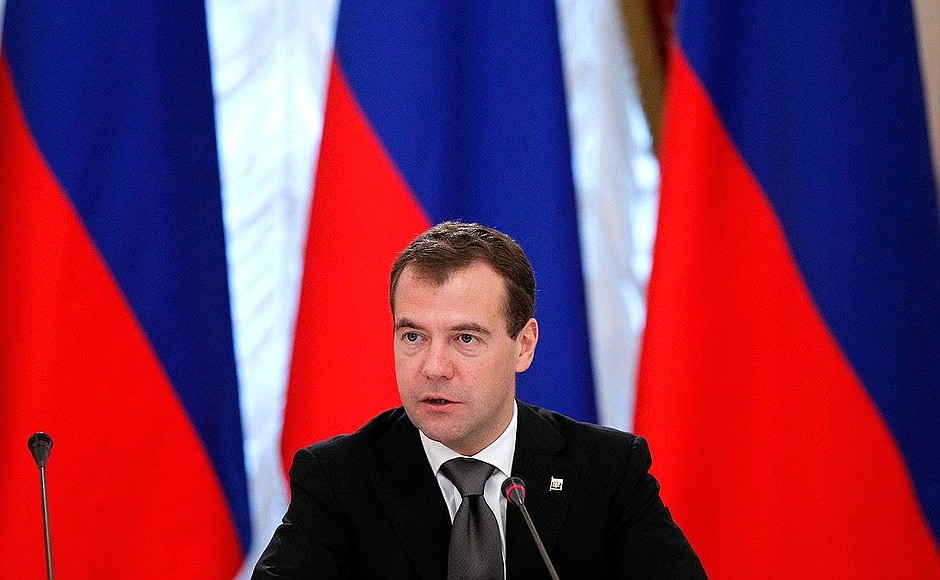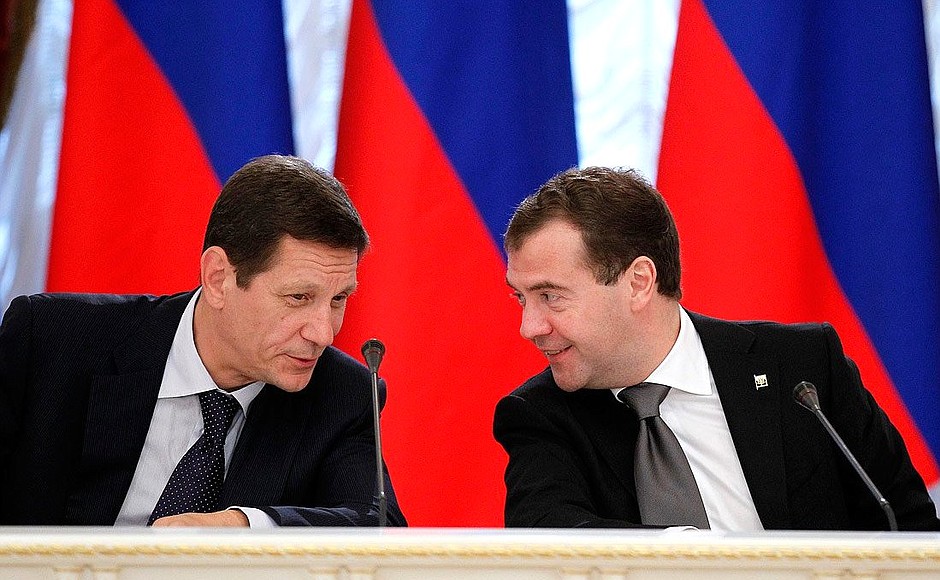Improving sport training, biomedical support for teams, the development of a system of financial incentives for athletes, coaches and team professionals were the subjects of discussion.
* * *
President of Russia Dmitry Medvedev: Dear friends,
Today we are holding a joint meeting of the Council for the Development of Physical Culture and Sport and the Russian Olympians Foundation. And today our country is celebrating the 22nd Russian Olympic Day, which is dedicated to the 100th anniversary of the foundation of the Russian Olympic Committee. Let us congratulate our Olympic Committee and wish it every success in forthcoming sporting events and in general.
Today competitions in various kinds of sports are taking place in dozens of cities. I think this is a good occasion to recall certain things, including the importance of physical fitness for children. And naturally, today it is important to remember that it is due to the Olympic movement that Olympic principles are spreading throughout our country, as well as around the world.
Dear colleagues,
”Programmes for developing different kinds of sports must be linked to clear objectives which are set for national teams. The sport ministry should make sure that these programmes are being correctly implemented.“
We are in touch quite regularly. I recall that we discussed the issue of elite sport in Sochi, just over a year ago. Following our meeting instructions relating to the preparation of the Russian national team for the forthcoming summer and winter Olympic Games were given. Today I would like to hear a substantive report on what has been done, what worked out well, and what has not yet been achieved.
Following the 2010 world championships in summer Olympic sports Russia was ranked second in the so-called informal team ranking. But we must remember that a whole range of events did not take place. The results of the 2010–2011 season were worse for Russia than at the Olympics in Vancouver, where we were somewhere around 11th place. In the informal team ranking our country dropped two places to 13th place. I would recall that there are less than three years prior to the games in Sochi. The main question is: what are our prospects there?
To answer that question we should probably touch on the traditional issue of elite sport management. Obviously, we have not yet created an optimal structure in that regard. The responsibility for training teams continues to be divided between several structures that I have already mentioned more than once: the Ministry of Sport, Tourism and Youth Policy, the Olympic Committee, various sports federations, the federal centre and the regions. Naturally, in any event all these structures will one way or another remain responsible for the preparation of national teams, but we still need to understand where the coordinating centre is. Today we will hear our colleagues speak to this issue.
A few points which, I believe, require our immediate attention.
First, the programmes for developing different kinds of sports which are conducted by the relevant sports federations. They are largely subsidised by the government and must be linked to clear objectives which are set for national teams. The sport ministry should make sure that these programmes are being correctly implemented by using a variety of mechanisms, including harsh ones such as suspension of activities and even recall of government accreditation from the federation if necessary.
Second, the sport ministry and sports federations must work more actively and more closely with regional authorities and municipalities. Where such contacts exist and cooperation occurs, athletes are very well trained. And there are enough such entities in our country. Tatarstan is a leader in this regard, and I am pleased to note this as we are in Kazan today.
Third, while making decisions with an important social impact, the sport ministry should take public opinion into account. Modern technology enables us to get easily feedback from our citizens, sports fans, and athletes and to analyse their input. Judging from my information sources, I can say that sports is a very popular topic. I am sure that all of you here receive similar messages.
”Attracting talented young people and improving the system for selecting and training an athlete pool remains a priority task.“
Fourth, attracting talented young people and improving the system for selecting and training an athlete pool remains a priority task. This issue is as old as humankind, but I'd finally like to hear what has been done in order to prepare a reserve pool of athletes, what is the fate of graduates of our sports universities, and what they do after graduating. This is not an idle question, especially since we have a considerable number of sports universities. Such universities exist only in Russia, and we have to understand their development prospects and what their graduates do. Other countries often lack these specialised universities, but perform no worse than we do. We must therefore understand how to improve their capacities and how to stimulate graduate employment. We must appraise how many coaches and professionals are trained abroad, how specialised schools for young people for the Olympic pool operate, a topic which we have repeatedly discussed together, and why their number is going down while funding is increasing. If this is a function of a desire not to spread money around it is probably commendable, but we still need to understand what is happening in this respect.
Another topic which has traditionally been raised at Council meetings is that of biomedical support for teams. We are currently spending quite decent money to achieve these goals. This spring we approved a corresponding three-year programme and we have to make sure that it has a maximum effect. Responsibility for implementing the programme lies with the Federal Biomedical Agency. Indicators of the health of our athletes and their results bear witness [to its performance].
I would like to announce to this eminent audience that several days ago I signed a law enabling the sport ministry to terminate the employment contract of any athlete who violates international anti-doping rules. I am sure that this bill, as well as earlier legislative changes, will represent an important contribution by Russia to the struggle for fair sport.
There remains an urgent need to promote modern national training facilities and sports equipment. I can tell you frankly that recently I have not seen facilities or equipment that would be competitive with their foreign analogues, with perhaps a few exceptions. This is very sad. It indicates that the relevant industry is not developing in Russia.
We need a single coordinating centre where we can effectively use the potential of our major academic centres. The National Research Institute for Physical Culture and Sport is not quite able to cope with this. It is for this reason that I am instructing the Cabinet to use it as a foundation for a Federal Research Centre for Physical Culture and Sport.
A few words on incentives for athletes, coaches and professionals. There are members and partners of the Russian Olympians Foundation here today. I would like to once again welcome all of them and thank them for their help. The Foundation plays a key role in establishing a system of financial incentives whose level is quite high, even by global standards. It is important to note that more than half of the Foundation's grants go to young people involved in various types of sports, and that support for children's and teenager's sports schools is consistently increasing.
”We need a single coordinating centre where we can effectively use the potential of our major academic centres. I am instructing the Cabinet to use it as a foundation for a Federal Research Centre for Physical Culture and Sport.“
I would conclude by mentioning an obvious thing that is no less important because it is plain to see. To achieve results in professional sports, elite sports, we must widely advertise popular sports and a healthy lifestyle, so that people adopt the habit of doing sports since childhood.
We have very good examples of how this is done in different regions. Moreover, in general I believe that we are witnessing positive changes everywhere. I travel a lot, and you also see how life changes. But this does not mean that there is nothing more to do. The situation is nevertheless still varying in the regions. It is absolutely necessary to make use of the media, modern information and telecommunications technology including the Internet, foreign experience of the sports and entertainment industry, and sports health services. In this respect, cooperation between the public and private sectors can be better than it currently is.
***
Colleagues,
You all know the situation, the timeframe is tight, but we have all the opportunities we need to have everything ready in time for the Olympics and Paralympics. We have already stepped up the pace. Everyone – the Government, the ministry, the Olympic Committee – is working flat out on getting everything ready for the Games in Sochi. I hope we will see the corresponding results.
I want to bring to your attention a different issue that also has national implications. The matter is not just about preparations for the Olympics or problems with any particular sport, but concerns decisions to put Russia’s name forward as a candidate to host international sports events.
We have achieved some excellent results in this area lately. Russia is seen as a candidate worthy of consideration now, and others are starting to appreciate us and turn to our services, especially in urgent situations such as after the tragedy in Japan. But at the same time, we are to be realistic in assessing where we stand a chance, and where we don’t, where we have money, and where we don’t, because we have a very tight schedule now through to 2018. There is no need to remind you what events we have to prepare for, and how much money this will cost.
I therefore instruct the Government and the Olympic Committee, together with the sports federations, to think about this, think about which events Russia could bid for, and look at whether it is really necessary, what our real chances would be, and how much it would cost. We have to calculate the costs and make sure the funds we have are properly distributed between financing the organisation of big international sports events and financing sport itself. This is a matter of our national priorities. I hope the Government, the Olympic Committee, and the sports federations will take a responsible line.
True, the deadline for carrying out this assessment that I have here in the list of instructions is March 1, 2012, but I think this is too long a deadline. I think we only need 3–4 months to make a proper assessment of what we should do over these next few years. Of course unforeseen circumstances can always come up, unexpected opportunities can arise, but we should have a plan in place whatever the situation. This is an issue of national importance and is the responsibility of everyone present.
Thank you for your work.



